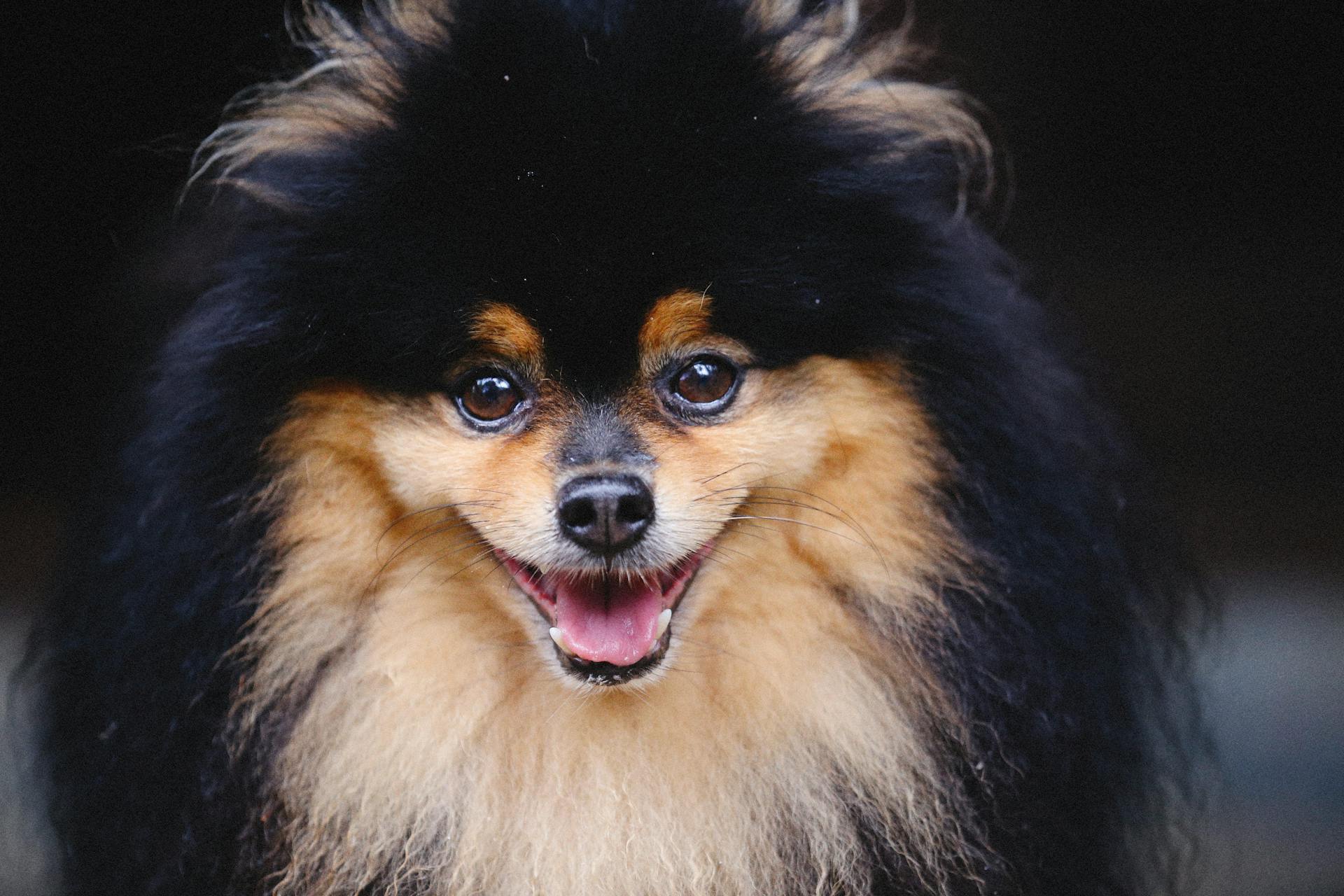
Pomeranian dog coughing can be a concerning issue for many pet owners. Pomeranians are prone to coughing due to their small size and brachycephalic (short-nosed) face structure.
A common cause of coughing in Pomeranians is tracheal collapse, which can be triggered by excessive barking or playing. This condition occurs when the trachea (windpipe) collapses, causing air to be forced through the narrowed passage, leading to a harsh, hacking cough.
Regular exercise and playtime can help strengthen a Pomeranian's respiratory system, reducing the risk of tracheal collapse. However, it's essential to monitor your Pomeranian's activity levels and avoid overexertion.
To prevent coughing in Pomeranians, it's crucial to keep them at a healthy weight through a balanced diet and regular check-ups with a veterinarian. Obesity can exacerbate respiratory issues in Pomeranians.
Suggestion: Coughing in Dogs after Drinking Water
What is Pomeranian Coughing?
Pomeranian coughing is a common issue that affects many small breed dogs, including Pomeranians. Tracheal collapse, a progressive disease of the trachea, is a common cause of coughing in Pomeranians.
You might like: Common Dog Diseases and Symptoms
This condition is often seen in middle-aged or older Pomeranians, and it can worsen over time. In severe cases, tracheal collapse can become a respiratory emergency requiring surgical intervention.
Pomeranians are also prone to kennel cough, a highly contagious respiratory disease. Kennel cough presents as a dry, hacking cough that can sound like something is stuck in their throat.
Many cases of kennel cough can resolve on their own with supportive care at home, but some pups may require emergency veterinary care if they're showing signs of pneumonia.
You might like: Pomeranian Dog Care
Causes and Symptoms
A Pomeranian dog coughing can be a concerning sight for any pet owner. The most common sign of tracheal collapse is a persistent, harsh and dry cough, sometimes described as a “goose-honking” cough. This cough can worsen with exercise, excitement, eating or drinking.
The trachea is a flexible tube supported by rings of C-shaped cartilage that hold the airway open during breathing and other movements. Tracheal collapse is caused when the cartilage rings weaken — flattening them and narrowing the airway.
In addition to tracheal collapse, kennel cough can also cause a persistent dry, hacking cough in dogs. Kennel cough in dogs can be caused by multiple bacteria and viruses, including Bordetella bronchiseptica bacteria, Canine adenovirus, Parainfluenza virus, and Mycoplasma.
Some combinations of viruses and bacteria can make your dog feel extremely ill. These dogs have more severe symptoms of kennel cough and need to be seen by their vet. Severe symptoms of kennel cough include lethargy, loss of appetite, fever, and labored breathing.
Dogs with respiratory infections can also cause coughing, especially in younger dogs. However, they can affect older dogs too. Foreign invaders such as bacteria, viruses, fungi, and parasites (e.g., canine lungworms) can make their way into a dog’s respiratory tract. This can lead to localized inflammation as the immune system marches into battle.
Here are some common causes of coughing in Pomeranians:
- Tracheal collapse
- Kennel cough
- Respiratory infections (bacterial, viral, fungal, or parasitic)
- Foreign bodies in the throat or esophagus
- Pneumonia
If you suspect your Pomeranian has something stuck in their throat, look for signs like frequent gagging, regurgitating, acting like it's painful to swallow, pawing at their mouth, or being unable to swallow food, water, or saliva.
Diagnosis and Treatment
Diagnosis of a Pomeranian dog coughing involves a physical exam and blood work to assess overall health. Your veterinarian will likely recommend these tests to determine the underlying cause of the cough.
X-rays are often taken to help diagnose tracheal collapse or other causes of coughing, but they might not always detect tracheal collapse. This is because X-rays are a snapshot in time, and the trachea can collapse during inhalation or exhalation.
Fluoroscopy, a type of specialized imaging, can show the trachea during inhalation and exhalation to diagnose where collapse is occurring and its severity. This test can be especially helpful in diagnosing tracheal collapse.
Bronchoscopy, a test that uses a fiber optic camera to go inside the trachea and airway, can also be used to directly visualize the dog's airway as they're breathing. This test can collect fluid samples to check for infection.
Treatment for a Pomeranian dog coughing may include cough suppressants, sedatives or anti-anxiety medications, corticosteroids, bronchodilators, and antibiotics if infections occur. In a respiratory emergency, dogs with tracheal collapse require immediate attention by a veterinarian, oxygen therapy, and these medications.
Here is a list of potential treatments for a Pomeranian dog coughing:
- Cough suppressants
- Sedatives or anti-anxiety medications
- Corticosteroids
- Bronchodilators
- Antibiotics, if infections occur
Your veterinarian may also recommend lifestyle adjustments, such as switching from neck collars to harnesses, avoiding respiratory irritants, and avoiding hot and humid environments.
Diagnosis
Diagnosis is a crucial step in determining the cause of your dog's cough. Your veterinarian will perform a physical exam and likely recommend blood work to assess your dog's overall health.
A gentle palpation of the throat can often elicit a cough in dogs with tracheal collapse. This is because the trachea can be easily compressed in these cases.
X-rays are often taken to help diagnose tracheal collapse or other causes of coughing. However, they might not always detect tracheal collapse because X-rays are a snapshot in time.
Fluoroscopy, also known as moving X-rays, can show the trachea during inhalation and exhalation to diagnose where collapse is occurring and its severity. This is especially useful in cases where tracheal collapse is suspected.
Bronchoscopy is a test that uses a fiber optic camera to go inside the trachea and airway, allowing the clinician to directly visualize the dog's airway as they're breathing. This test can also collect fluid samples to check for infection.
If this caught your attention, see: Canine Diabetes Test

In some cases, a diagnosis for kennel cough in dogs can be made based on the dog's symptoms, history, and response to therapy. However, diagnostic testing is recommended in certain situations, such as when pneumonia is suspected or the dog does not respond to supportive care.
Here are some scenarios where diagnostic testing is recommended:
- Dogs where pneumonia is suspected
- Dogs that do not respond to supportive care
- Dogs with signs of systemic disease
- If an outbreak is occurring in multiple dogs
Treatment
If your dog has tracheal collapse, treatment will depend on the severity of the condition and any underlying health issues.
In a respiratory emergency, immediate attention by a veterinarian, oxygen therapy, and medications like cough suppressants, sedatives, corticosteroids, bronchodilators, and antibiotics are crucial.
To manage tracheal collapse, you'll need to make lifestyle adjustments, such as switching from neck collars to harnesses and avoiding respiratory irritants like cigarette smoke.
Some dogs may require a surgical procedure, which involves placing a stent within the trachea to help prevent collapse. This operation is performed by a board-certified veterinary surgeon.
Here are some potential treatment options for tracheal collapse:
- Cough suppressants
- Sedatives or anti-anxiety medications
- Corticosteroids
- Bronchodilators
- Antibiotics, if infections occur
- Oxygen therapy
- Surgical procedure (tracheal stent)
It's essential to address any underlying health conditions contributing to worsening clinical signs, such as obesity and heart disease.
Managing Collapsed Trachea in Dogs
If your Pomeranian has a diagnosis of collapsed trachea, it's essential to address the issue naturally to avoid stressing their health. Natural approaches can be used to manage the condition and even improve your dog's health.
Dogs with collapsed trachea may experience a goose honking cough, gagging, and respiratory distress, so it's crucial to seek medical therapy and weight management. However, in severe cases, surgical intervention may be necessary.
You can use holistic therapies such as TCVM (acupuncture, Chinese herbs, Tui Na, food therapy) and homeopathy to correct the anatomical problem. Homeopathy can be especially helpful, with many small dogs becoming asymptomatic with homeopathic treatments and general health and diet improvements.
Some homeopathic remedies used successfully include Aconite, Belladonna, Stramonium, Calcarea fluorica, and Drosera. You'll need to ask a professional homeopath to analyze your dog's symptom picture and choose the best remedy.
To manage your Pomeranian's collapsed trachea, it's essential to understand that all dogs can develop tracheal collapse, but small breed dogs are at a higher risk. The risk is even higher in older dogs, so it's crucial to address the issue early on.
See what others are reading: Are Therapy Dogs Service Animals
Here are some natural approaches to manage your Pomeranian's collapsed trachea:
- Use a harness instead of a collar during walks to avoid placing extra pressure on the trachea.
- Avoid irritants such as household cleaners, cigarette smoke, and dust to reduce irritation and promote recovery.
- Use Western herbs, Reiki, flower essences, aromatherapy, chiropractic, osteopathy, and herbal supplements to manage the condition and improve your dog's health.
By following these natural approaches and seeking professional help when needed, you can help your Pomeranian manage collapsed trachea and live a happy and healthy life.
Prevention and Care
To minimize the risk of kennel cough, vaccination against Bordetella bronchiseptica is generally recommended. This can help protect your Pomeranian dog from the common cause of kennel cough.
Ask about vaccine requirements when looking for grooming facilities, daycare facilities, or doggy play date partners to ensure the dogs your pup will be in contact with are also vaccinated.
Prevention of
Preventing kennel cough in your dog is crucial, especially if they're prone to socializing with other dogs. Vaccination against Bordetella bronchiseptica is generally recommended to minimize the risk.
Ask about vaccine requirements when looking for grooming facilities, daycare facilities, or doggy play date partners to ensure the dogs your pup will be in contact with are also vaccinated.

Fully vaccinated dogs can still get kennel cough, but this preventative measure can help keep your pet protected.
To soothe coughing and minimize irritation, you can give your dog natural remedies like plantain, manuka honey, CBD oil, and marshmallow root. These remedies can be found in the wild or purchased at a health food store.
Plantain eases coughing and throat inflammation, and can be made into a mucilage that coats the throat and respiratory tract to relieve discomfort and irritation.
You can give your dog manuka honey mixed with a little warm water in a bowl, up to three times a day depending on how often they're coughing.
CBD oil can help soothe your dog's cough and keep them from getting too excited, especially in mild cases of tracheal collapse.
Marshmallow root loosens mucus, inhibits bacteria, and eases dry coughs, creating its own mucilage to coat irritated throats.
By taking these preventative measures and using these natural remedies, you can help keep your dog healthy and happy.
You might like: Robitussin for Kennel Cough
Dog Vomiting
Vomiting in dogs can be a concerning sign, but understanding what causes it can help you identify the issue.
Dogs may vomit due to a variety of reasons, including eating too quickly or gobbling food, which can lead to swallowing air and causing stomach upset.
The way your dog vomits can also be a clue to what's causing the problem. If your dog is vomiting, it's often accompanied by a clear, watery liquid, which is a sign that the stomach is empty.
In some cases, vomiting can be a sign of a more serious issue, such as eating something toxic or ingesting a foreign object. If you suspect your dog has ingested something hazardous, it's essential to seek veterinary attention right away.
A dog's vomiting can also be triggered by a viral or bacterial infection, which can cause stomach upset and lead to vomiting.
In order to determine the cause of your dog's vomiting, it's crucial to provide a detailed description of the vomiting to your veterinarian, including the frequency, duration, and consistency of the vomiting.
Suggestion: Shih Tzu Bloated Stomach Symptoms
Frequently Asked Questions
Why does my Pomeranian sound like he has a hairball?
Your Pomeranian's coughing sound is likely due to tracheal inflammation, often caused by post-nasal drip. This can be treated with proper care and veterinary attention to prevent discomfort and potential complications.
Why is my dog coughing like something is stuck in his throat?
Your dog's cough may be caused by a condition called kennel cough or canine infectious respiratory disease complex (CIRDC), which can make it sound like something is stuck in their throat
Sources
- https://www.vet.cornell.edu/departments-centers-and-institutes/riney-canine-health-center/canine-health-information/tracheal-collapse
- https://www.petmd.com/dog/conditions/respiratory/kennel-cough-dogs-symptoms-and-treatments
- https://www.trudellanimalhealth.com/learn/further-reading/tracheal-collapse-dogs-what-it-symptoms-look-and-how-treat-it
- https://www.dogsnaturallymagazine.com/how-to-manage-collapsed-trachea-in-dogs/
- https://toegrips.com/dog-coughing-and-gagging/
Featured Images: pexels.com


